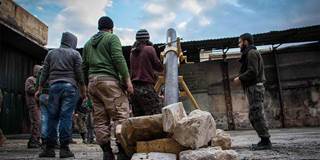The Arab world and its neighbors are stuck in a violence trap. Indeed, by redrawing the region’s economic boundaries, the latest wave of violence has brought about a veritable trade shock, the true scale and significance of which has largely gone unnoticed.
OXFORD – The Arab world and its neighbors are stuck in a violence trap. The fighting in Libya, Syria, Yemen, and Iraq, together with the predations of groups like the Islamic State, is destroying the economic links needed to ensure long-term political stability. Indeed, by redrawing the region’s economic boundaries, the latest wave of violence has brought about a veritable trade shock, the true scale and significance of which has largely gone unnoticed.

OXFORD – The Arab world and its neighbors are stuck in a violence trap. The fighting in Libya, Syria, Yemen, and Iraq, together with the predations of groups like the Islamic State, is destroying the economic links needed to ensure long-term political stability. Indeed, by redrawing the region’s economic boundaries, the latest wave of violence has brought about a veritable trade shock, the true scale and significance of which has largely gone unnoticed.